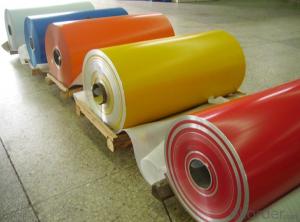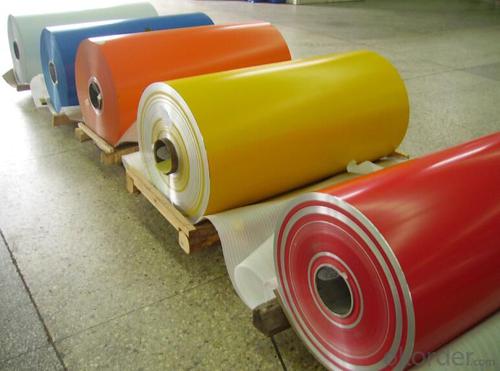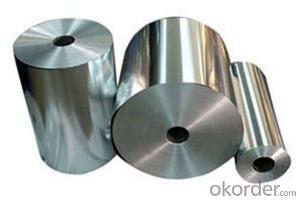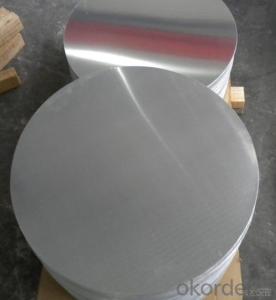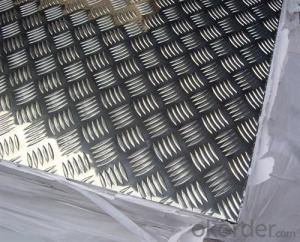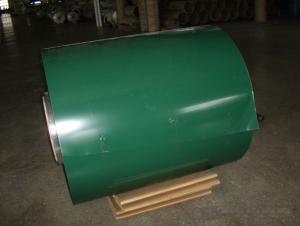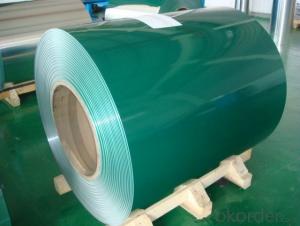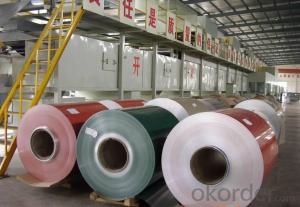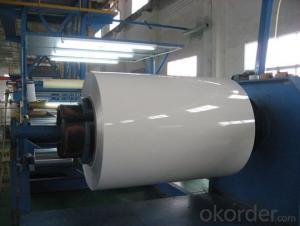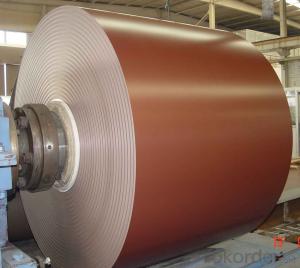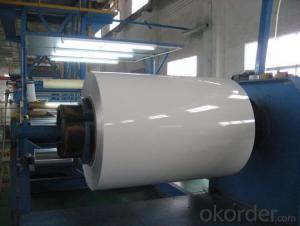Ral 1032 PVDF 25 Micros Coated Aluminum Coil Price
- Loading Port:
- Shanghai
- Payment Terms:
- TT OR LC
- Min Order Qty:
- 5 m.t.
- Supply Capability:
- 50000 m.t./month
OKorder Service Pledge
OKorder Financial Service
You Might Also Like
Specification
Description
Product | RAL 1032 PVDF 25 Micros Coated Aluminium Coil | ||
Alloy | 1100, 1145, 1050, 1060, 1070, 3003, 3013, 3005, 3A21,4343,4045, 5052, 5082, 5083, 5086,6061, 8011 etc. | Temper | H12.H14.H16.H18.H22. H24.H26.H32.H34.H36. H38.O etc. |
Thickness | 0.2-7.0mm | Width | Until 2550 |
Painting items | PE and PVDF | Color | All Standards of RAL |
Coil weight | At clients’ requestments | MOQ | 5 tons |
Payment terms | 30% down payment 70% against B/L copy, L/C at sight | ||
Delivery time | 20-30 days after getting your down payment | ||
Package | Wooden Pallet (Customized packing ways are welcomed) | ||
Remarks | The special dimensions can be produced according to clients’ specification | ||
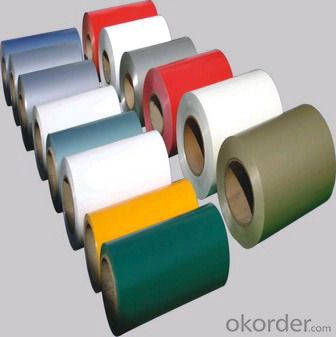
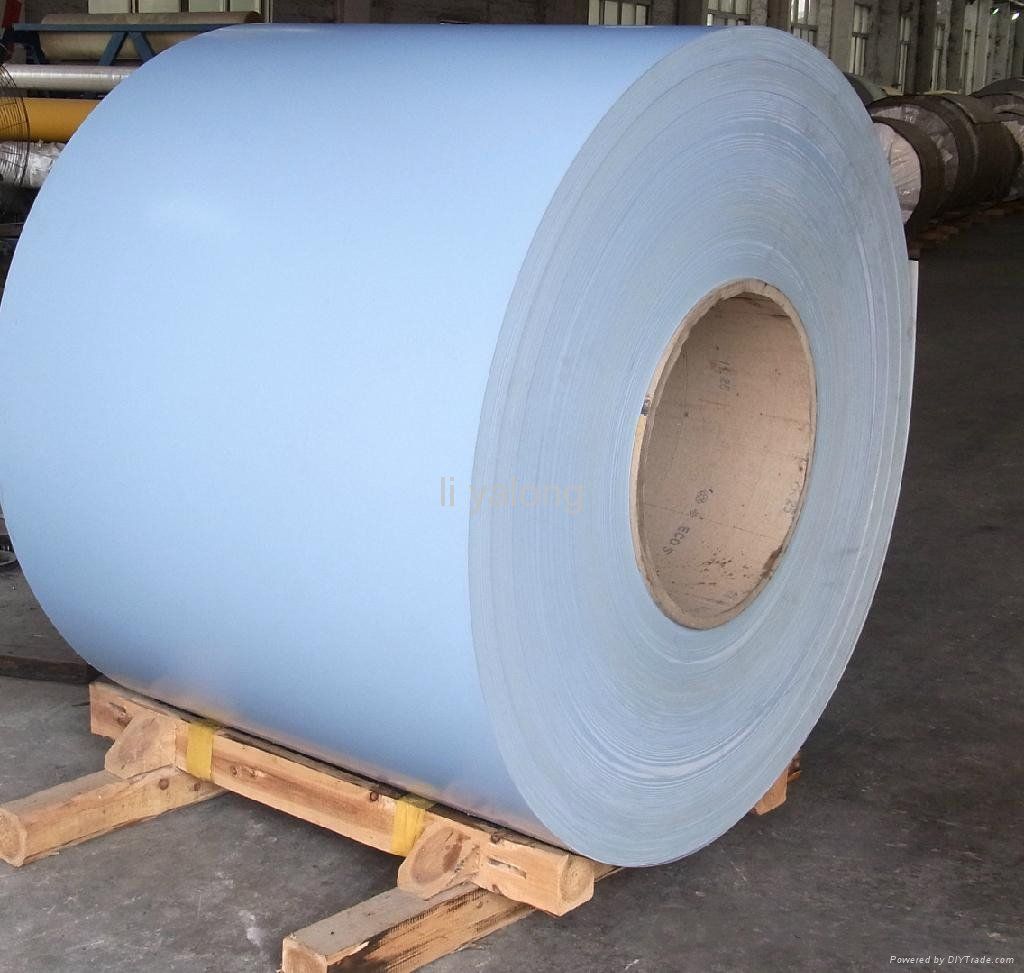
PE and PVDF Painting
Polyester Coatings (PE)
PE (polyester) coatings exhibit an excellent combination of hardness, flexibility, flow, appearance, and superior resistance to dirt retention in indoor and outdoor applications. These coatings are highly resistant to abrasion, metal marking, staining, and marring, and require minimal maintenance. Glazetech uses polyester paints which provide excellent colour and gloss retention properties.
Polyvinylidene Fluoride Coatings (PVDF)
PVDF (polyvinylidene fluoride) is a chemical resistant thick film barrier coating commonly used in architectural applications where both excellent appearance and substrate protection must be maintained over a long period of time. This coating is unaffected by most chemicals and solvents and has excellent wear and abrasion resistance. PVDF also has a high dielectric strength, excellent resistance to weathering and the ability to self extinguish.Application
Widely used in manufacturing of products as well as other industrial applications like:
Products Materials: PP cap stock, the traffic sign, air-conditioner heat and exchangers, food container, household foil, pharmaceutical packing, cigarettes packing etc.
Building Materials: aluminum curtain wall base plate, ACP, aluminum, ceilings, aluminum sheets, honeycomb panels and aluminum roofing, lighting decoration, household electrical appliances, food package (such as pop can cover & ring-pull), furniture ect.
- Q: Can aluminum coils be used in the production of aluminum composite ceilings?
- Yes, aluminum coils can be used in the production of aluminum composite ceilings. Aluminum coils are often used as the base material for manufacturing aluminum composite panels, which are then used to create ceilings. These coils are typically made of high-quality aluminum alloy and have undergone various processes to ensure their strength, durability, and aesthetic appearance. The aluminum coils are coated with a protective layer, such as PVDF or polyester, to enhance their resistance to weathering, UV rays, and corrosion. This coating also allows for a wide range of color options, providing flexibility in design choices for aluminum composite ceilings. Overall, aluminum coils are an essential component in the production of aluminum composite ceilings, offering a lightweight, fire-resistant, and long-lasting solution for various architectural and interior design applications.
- Q: What is the typical tensile strength of aluminum coils?
- The typical tensile strength of aluminum coils can vary depending on the specific grade and temper of the aluminum being used. Generally, aluminum coils have a tensile strength ranging from 30,000 to 75,000 pounds per square inch (psi). However, it is important to note that this range can be narrower or wider depending on the intended application and the specific alloy being used. Additionally, factors such as the thickness and width of the coil may also impact the tensile strength.
- Q: Can aluminum coils be used in electrical busbars?
- Yes, aluminum coils can be used in electrical busbars. Aluminum offers good conductivity, is lightweight, and cost-effective, making it suitable for use in busbars. However, proper insulation and connection techniques must be employed to address the higher thermal expansion and potential corrosion issues associated with aluminum.
- Q: Is it safe and effective to use aluminum coils for baking purposes?
- <p>Aluminum coils are generally not recommended for baking. While aluminum is a good conductor of heat and is used in some baking pans, using aluminum coils directly in baking can lead to uneven heating and potential health concerns due to the leaching of aluminum into the food. It's better to use materials specifically designed for baking, such as silicone or metal baking sheets, which are safe and provide even heat distribution.</p>
- Q: How are aluminum coils used in the production of musical instruments?
- Aluminum coils are commonly used in the production of musical instruments, particularly in wind instruments like saxophones and trumpets. These coils are shaped into a specific design and attached to the instrument to create the desired sound. The aluminum material allows for a lightweight and durable construction, enhancing the instrument's playability and resonance.
- Q: How are aluminum coils tested for surface adhesion?
- Aluminum coils are tested for surface adhesion through various methods such as tape tests, peel tests, and wet adhesion tests. These tests involve applying adhesive tapes, peeling them off, and evaluating the level of coating adhesion. Additionally, wet adhesion tests involve subjecting the coils to water or chemical exposure to assess the durability of the coating. These procedures help determine the quality and adherence of the surface coating on aluminum coils.
- Q: Can aluminum coils be painted or coated for aesthetic purposes?
- Yes, aluminum coils can be painted or coated for aesthetic purposes. Aluminum is a versatile material that can be easily painted or coated to enhance its appearance. Painting or coating aluminum coils can provide a wide range of color options and finishes, allowing for customization and aesthetic appeal in various applications. The paint or coating can also provide additional protection against corrosion and weathering, increasing the durability and longevity of the aluminum coils. However, it is important to select the appropriate type of paint or coating that is compatible with aluminum and suitable for the intended use to ensure optimal results.
- Q: Can aluminum coils be formed into different shapes?
- Yes, aluminum coils can be formed into different shapes. Aluminum is a highly malleable metal, which means it can easily be bent, shaped, and formed without breaking. This property makes it an ideal material for various applications where flexibility and versatility are required. Aluminum coils can be formed into different shapes using a variety of techniques, such as bending, rolling, stamping, extrusion, or even by using specialized machinery like a coil forming machine. These processes allow the aluminum coils to be transformed into a wide range of shapes, including sheets, plates, tubes, wires, or complex three-dimensional forms. The ability to form aluminum coils into different shapes makes it an excellent choice for industries such as construction, automotive, aerospace, and manufacturing, where customized parts and components are often needed.
- Q: How do aluminum coils compare to other metal coils in terms of cost?
- Compared to other metal coils, aluminum coils are typically more cost-effective. This is mainly because of the plentiful availability of aluminum as a raw material and the relatively inexpensive extraction and production processes. Furthermore, aluminum coils provide a lightweight and long-lasting solution, thus reducing costs associated with transportation and installation. Moreover, aluminum is resistant to corrosion, which eliminates the necessity for frequent maintenance and replacement expenses. On the contrary, alternative metal coils like copper or stainless steel may have higher initial costs and necessitate additional coatings or treatments to prevent corrosion. Consequently, when evaluating the overall cost, aluminum coils are often a more economical option.
- Q: What are the different alloys used in aluminum coils?
- Some of the different alloys used in aluminum coils include 1100, 3003, 5052, and 6061.
Send your message to us
Ral 1032 PVDF 25 Micros Coated Aluminum Coil Price
- Loading Port:
- Shanghai
- Payment Terms:
- TT OR LC
- Min Order Qty:
- 5 m.t.
- Supply Capability:
- 50000 m.t./month
OKorder Service Pledge
OKorder Financial Service
Similar products
Hot products
Hot Searches
Related keywords
